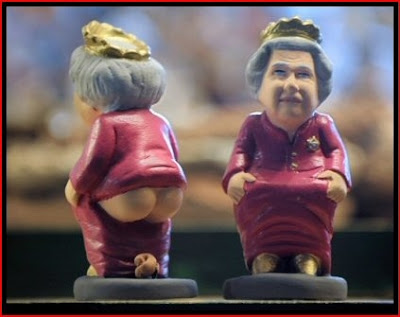Social mobility? Not While We Have Our Hereditary Monarchy
Social mobility? Not while we have our hereditary monarchy
The royal family depends on a history our schools don't teach any longer and a lifestyle too close to Hello! for comfort
Editorial. The Observer
3 June 2012
Once upon a time, it all seemed so simple. "Queen and Empire: a Pageant of unparalleled meaning and magnificence." Or so ran the newspaper headlines in 1897 when Queen Victoria celebrated her 60 years on the throne. Some 50,000 troops converged at St Paul's to give thanks: the Dyaks from Borneo, the Sikhs from the Punjab, all honouring "the Queen of Earthly Queens". Britain strode into the future with pride, confidence, pomp and circumstance. But this weekend, as a second monarch has her diamond moment? The headlines look back, not forward. There is, and will be, magnificence all right, carefully screened against terrorist outrages, suitably muted for an era of austerity. But the "meaning" of it all remains painfully elusive.
That isn't, in any sense, the fault of the 86-year-old who commands stage centre. Hereditary monarchy is a throw of the dice. Queen Elizabeth II has served Britain well. She's been tireless, devoted and beyond personal reproach. She deserves the affection that will be lavished on her today. But the nature of the country she reigns over has changed utterly, and so, in turn, has the nature of its monarchy.
No dissembling. The Observer has long seen Britain's monarchy as an anachronism, a barrier to its full freedom and renewal. You cannot worry seriously about social mobility or last year's big idea of an even bigger society without seeing the furred arteries of class, deference and birth that hold us back. Where else in the democratic world does an unelected second chamber wield legislative power? Where else is the confected pall of the past, with its lords, ladies and faintly ridiculous rituals so strong?
The monarchy has changed over those 115 years. It has descended, sometimes unsteadily, from its pedestal of remoteness, so that it sometimes seems to exist today at the whim of the nearest news-stand or flick of a TV remote. So 80% of Britons support the royal status quo, routing a mere 13% of republicans on the latest polls. So what happens next year or the year after when poll ratings take a sudden dive (as they inevitably do)? Fold a formidable queen, a gallant duke and a couple of young, photogenic princes into the mix, season with a dash of Kate and sprinkle of tiny feet and you have the perfect celebrity recipe for Leveson times. Yet celebrity culture, as we know, always moves restlessly on. It doesn't like old and boring. It would like – those polls again – to give King Charles and Camilla a miss and jump straight to a more glamorous generation.
By the time that grey King William and Queen Catherine arrive, decades on, the moving finger of adulation will surely be dancing elsewhere. Just look at some of the guests who ate lamb and asparagus at Windsor's great jubilee lunch a couple of weeks ago: Prince Hans-Adam of Liechtenstein, Grand Duke Henri of Luxembourg, King Mswatsi of Swaziland, the Emir of Qatar, Prince Albert of Monaco — plus, from Greece, Romania, Bulgaria and Yugoslavia, the deposed remnants of former dynasties.
There was some disquiet as that party assembled. What on earth was a brutal King of Bahrain doing in such company? But the message was rather subtler than that.
Hereditary monarchy survives in northern Europe – in Belgium, the Netherlands, Sweden, Denmark – by lying low and living modestly, wearing woolly sweaters fit for The Killing. In other lands – Japan, Thailand – it still retains an almost mystic allegiance. In the Arab and African worlds, monarchy means crude power. There is really no common theme to serve with those "juicy Kent strawberries" on the Windsor menu. And nor is there a continuing royal show, anywhere in the world, to match the buckets full of media significance now heaped again over the House of Windsor this long bank holiday.
It's a weird brew: public service and publicly funded privilege intermingled. It depends on a history our schools don't teach any longer and a lifestyle too close to Hello! for comfort. It has sustained Elizabeth II through 60 testing years. Inertia or better may sustain it for many more. But Britain's future? There, perhaps, it is best to close discussion, like London's bridges, and live for the moment where meaning doesn't much matter. The Observer


2 comments:
Yo, Elizabeth II has been Queen of England for 60 years. DAYUM, that's a lot of looking at things.
@KimJongNumberUn
LOL I love it and I like your thinking.
http://onlyinamericablogging.blogspot.com/2012/02/hey-what-you-looking-at-kim-jong-un.html
Post a Comment